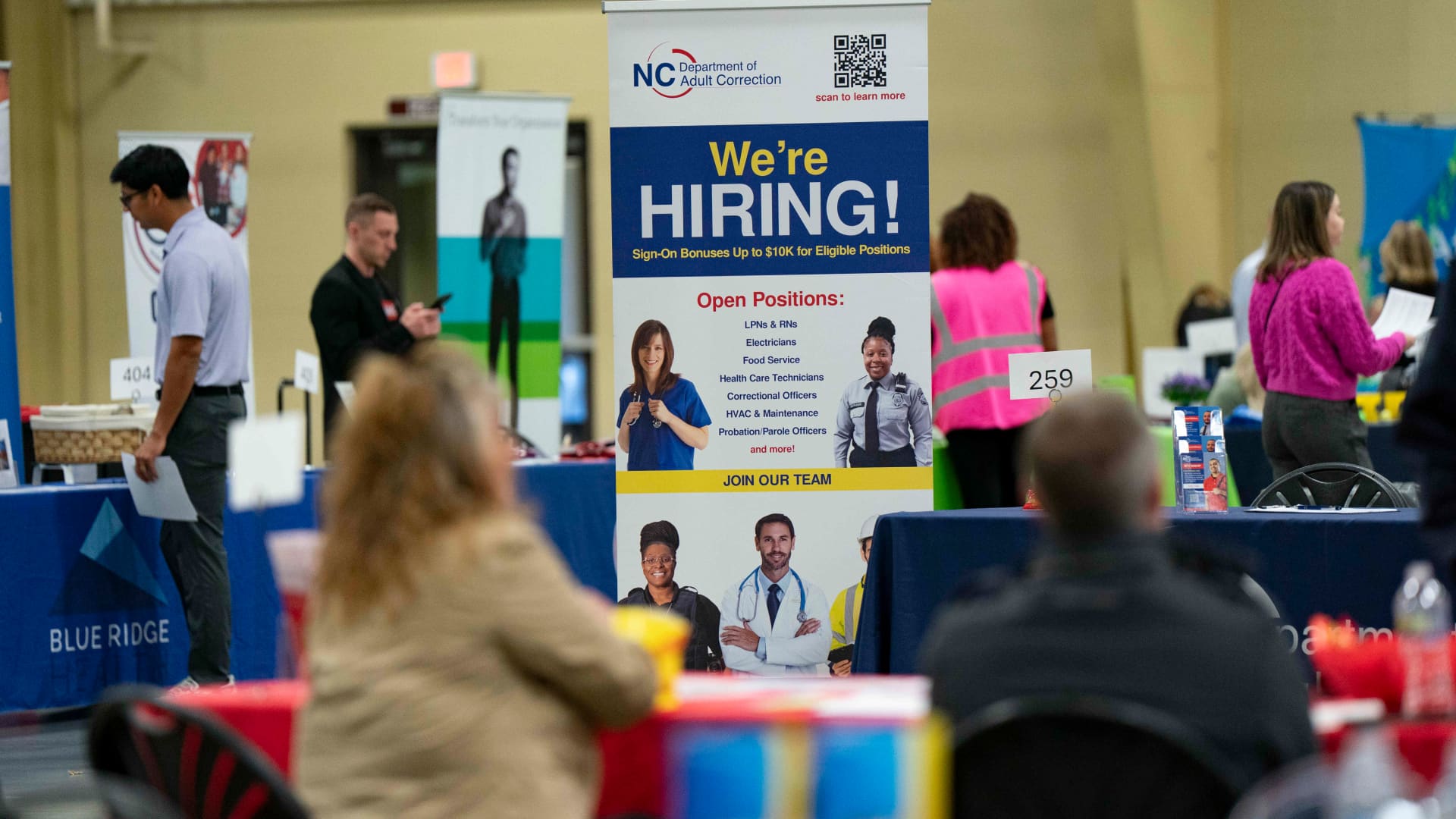Economics
America’s immigration policies are failing
Published
1 year agoon

Your browser does not support the <audio> element.
SO YOU WANT to come to America. Venezuela, your home country, is suffering under Nicolás Maduro’s violent kleptocracy. What to do? Good luck getting a green card: employers won’t bother sponsoring a low-skilled worker like you, and you have no immediate family in America to vouch for you. Your WhatsApp is filled with news of friends who have crossed America’s southern border. You decide to follow them and, after a hellish trip, make it to the Rio Grande. You could try to slip across undetected—about 600,000 “gotaways” managed it last year. Or you can tell the border agents who intercept you that you want asylum. Odds are that they will release you with a court date scheduled in several months’ time, kickstarting a process that may take years. Welcome to America.
In November 2023 nearly 250,000 migrants crossed the southern border. The surge—and the perception that America’s borders are open—is a giant political liability for President Joe Biden. Just 27% of Americans tell pollsters that they approve of his handling of the border. More than twice as many trust Donald Trump on the issue. The fact that surging migration over the southern border could cost Mr Biden the election in November has made the problem trickier to solve. Wrangling over a deal to fund Ukraine in exchange for tighter border security and asylum limits has dragged on for months. Although Senate leaders say an agreement is close, some Republicans—reportedly including Mr Trump—seem to want the border chaos to fester, to better beat Mr Biden over the head with it during the election campaign.
Several factors explain the surge: violence and instability around the globe; plentiful job openings in America; the accurate perception that Mr Biden is more welcoming than his predecessor; and cumbersome, limited pathways to come legally. An overwhelmed border apparatus also invites more crossings, notes David Bier of the Cato Institute, a think-tank. When people hear that they are unlikely to be detained and deported, more try their luck.
Decades of neglect and partisan rancour have crippled America’s immigration system and created a situation where immigrants view asylum-seeking as the surest way to get into the country, rather than a long-shot attempt. Congress last made meaningful reform to immigration law in 1990. Comprehensive, bipartisan reform has seemed close several times since, only to fall apart in the end. In 2006, 2007 and 2013 bipartisan Senate bills included a path to citizenship for undocumented immigrants, more visas for workers and stricter enforcement at the border. In recent years Democrats have largely been animated by the desire to protect daca recipients, immigrants who were brought to America as children, from deportation.
Mr Trump’s candidacy upended the politics of immigration. When he launched his campaign in 2015, the number of migrants apprehended nationwide was at its lowest level since 1971. That fact did not, of course, stop Mr Trump from declaring that migrants threatened the American way of life. (“They’re bringing drugs. They’re bringing crime. They’re rapists. And some, I assume, are good people.”) In 2019 irregular entries at the southern border jumped. Mr Trump saw detention as a means of deterrence and made some migrants with pending asylum claims wait in Mexico. At one time during his presidency nearly 57,000 people were detained. The surge was so great that even Mr Trump released a quarter of migrants into the country immediately with a notice to appear (NTA) in immigration court.
Borderline, personalities, disorder
Mr Biden reduced detentions—the number in custody today is around 38,000—and scrapped the requirement to remain in Mexico. He has tried less effective deterrents. His administration wants to steer migrants towards ports of entry where they arrive for appointments made via a smartphone app. Most are admitted with permission to stay for a year or two. By contrast people caught crossing illegally are presumed ineligible for asylum, with a few narrow exceptions, and quickly deported.

At least that is how it is supposed to work. In reality most migrants who cross illegally are still being released into the country, and irregular arrivals far exceed those at official crossings. Once on American soil a migrant can request asylum, which involves a screening with an asylum officer. Because of Mr Biden’s reluctance to pursue detention and an insufficient number of asylum officers, in November seven in ten were handed an NTA and sent on their way.
Last year the Biden administration also began granting parole to up to 30,000 Cubans, Haitians, Nicaraguans and Venezuelans each month, if applicants identified a financial sponsor in America. Again the goal was to make flows more orderly and decrease illegal arrivals. Permission to stay lasts two years but can be revoked at any time. Illegal crossings by Haitians, Nicaraguans and Cubans plummeted. But Venezuelans, who are less likely to have social ties to America, continue to enter illegally. “Most of the Venezuelans arriving now don’t have family, friends, relatives,” says Theresa Cardinal Brown, who served in the Department for Homeland Security in the Bush and Obama administrations.
Once across the border, migrants head to cities. Shelter systems in New York City, Chicago and Denver are overwhelmed and their mayors want Mr Biden’s help. This is partly the doing of Greg Abbott, the Republican governor of Texas, who is busing migrants to Democratic-run cities. But big cities are also natural magnets for migrants.
With an NTA in hand, new arrivals enter the court system, where the backlog is growing faster than judges can keep up. Cases in immigration court surpassed 3m in November. It takes more than four years on average just to get an initial asylum hearing. Doubling the number of judges would clear the backlog—but only by 2032, according to an estimate from the Congressional Research Service.
Half of asylum cases are denied, and decisions are inconsistent. One judge in Houston denied 95% of her asylum cases last year; another in San Francisco denied just 1% of hers. But the immense wait, low chance of detention and the prospect of work in America encourage migrants with a weak claim to cross the border. Prioritising the most recent arrivals’ cases would reduce this incentive, notes Stephen Yale-Loehr of Cornell Law School. A long journey seems less worth it if the reward is deportation rather than an NTA.
The looming election, Mr Trump’s perceived strength on border issues and Mr Biden’s desire to arm Ukraine mean that the president wants to make a deal. His openness to tougher border enforcement is also no doubt fuelled by Americans’ rightward turn on immigration. Polling from YouGov suggests that more Americans favour building a southern border wall than don’t. Even 32% of Democrats now say they support the idea, up from 20% in 2022.
Whether the House and the Senate can agree on reform is questionable. A deal may include funding for more Border Patrol agents, the ability to shut down migrant intake if encounters reach a certain level, a higher bar for migrants to pass their interview—so that they are not released into the country unless they are likely to actually receive asylum—and limits on parole. Any changes to asylum rules will almost certainly be challenged in the courts.
But House Republicans have waffled, often insisting that they would accept nothing other than HR2, a hardline immigration bill passed along party lines last year that would be dead on arrival in the Senate. On the left, progressives do not want to tighten access to asylum. Both groups should beware. A new poll from The Economist and YouGov suggests that a plurality of Americans want Congress to pass a bill that both funds Ukraine and restricts asylum. The politicians should not ignore their voters. ■
Stay on top of American politics with Checks and Balance, our weekly subscriber-only newsletter, which examines the state of American democracy and the issues that matter to voters.
You may like
-


Here are the companies making job cuts
-


Trade deficit fell by a record amount in April as demand dropped for imports
-


What a New Jersey election says about MAGA America
-


Pete Hegseth once scared America’s allies. Now he reassures them
-


Police are cracking down on cyclists in New York City
-


California’s carbon market reaches an inflection point
Economics
World could be facing another ‘China shock,’ but there’s a silver-lining
Published
5 hours agoon
June 6, 2025
Singapore-based online grocery retailer Webuy staff is offloading containers filled with goods shipped from China.
SINGAPORE — Vincent Xue runs an online grocery retail business, offering fresh produce, canned food, packaged easy-to-cook ingredients to cost-conscious local consumers in Singapore.
Xue’s Nasdaq-listed Webuy Global sources primarily from suppliers in China. Since late last year, one third of his suppliers, saddled with excess inventory in China, have offered steep discounts of up to 70%.
“Chinese domestic markets are too competitive, some larger F&B manufacturers were struggling to destock their inventories as weak consumer demand drags,” he said in Mandarin, translated by CNBC.
Xue has also gotten busier this year after sealing a partnership with Chinese e-commerce platform Pinduoduo that has been making inroads into the Southeast Asian country.
“There will be about 5-6 containers loaded with Pinduoduo’s orders coming in every week,” Xue said, and Webuy Global will support the last-mile delivery to customers.
At a time when steep tariffs are deterring Chinese exports to the U.S., while domestic consumption remains a worry, overcapacity has led Chinese producer prices to stay in deflationary territory for more than two years. Consumer inflation has remained near zero.
Still, the country is doubling down on manufacturing, and this production overdrive is rippling through global markets, stirring anxiety in Asia that a flood of cheap imports could squeeze local industries, experts said.
“Every economy around the world is concerned about being swamped by Chinese exports … many of them [have] started to put up barriers to importing from China,” said Eswar Prasad, senior professor of trade policy and economics at Cornell University.
But for inflation-worn economies, economists say the influx of low-cost Chinese goods comes with a silver-lining: lower costs for consumers. That in turn could offer central banks some relief as they juggle lowering living costs while reviving growth on the back of rising trade tensions.
For markets with limited manufacturing bases, such as Australia, cheap Chinese imports could ease the cost-of-living crisis and help bring down inflationary pressure, said Nick Marro, principal economist at Economist Intelligence Unit.
Emerging growth risks and subdued inflation may pave the way for more rate cuts across Asia, according to Nomura, which expects central banks in the region to further decouple from the Fed and deliver additional easing.
The investment bank predicts Reserve Bank of India to deliver additional rate cuts of 100 basis points during rest of the year, central banks in Philippines and Thailand to cut rates by 75 basis points each, while Australia and Indonesia could lower rates by 50 basis points, and South Korea by a quarter-percentage-point.
‘China shock’
In Singapore, the rise in costs of living was among the hot-button issues during the city-state’s election campaigning in the lead up to the polls held last month.
Core inflation in the country could surprise at the lower end of the MAS forecast range, economists at Nomura said, citing the impact of influx of cheap Chinese imports.
The city-state is not alone in witnessing the disinflationary impact as low-cost Chinese goods flood in.

“Disinflationary forces are likely to permeate across Asia,” added Nomura economists, anticipating Asian nations to feel the impact from “China shock” accelerating in the coming months.
Asian economies were already wary of China’s excess capacity, with several countries imposing anti-dumping duties to safeguard local manufacturing production, even before the roll-out of Trump’s sweeping tariffs.
In the late 1990s and early 2000s, the world economy experienced the so-called “China shock,” when a surge in cheap China-made imports helped keep inflation low while costing local manufacturing jobs.
A sequel of sorts appears to be under way as Beijing focuses on exports to offset the drag in domestic consumption.
Chinese exports to the ASEAN bloc rose 11.5% year on year in the first four months this year, as shipments to the U.S. shrank 2.5%, according to China’s official customs data. In April alone, China’s shipments to ASEAN surged 20.8%, as exports to U.S. plunged over 21% year on year.
These goods often arrive at a discount. Economists at Goldman Sachs estimate Chinese products imported by Japan in the past two years to have become about 15% cheaper compared to products from other countries.
India, Vietnam and Indonesia have imposed various protectionist measures to provide some relief for domestic producers from intense price competition, particularly in sectors facing overcapacity and cheap imports.
While for a large number of countries an influx of Chinese goods is a trade-off between lower inflation and the adverse impact on local production, countries such as Thailand could be facing a double-edged sword.
Thailand will likely be the hardest-hit by “China shock,” even sliding into a deflation this year, Nomura economists predict, while India, Indonesia and the Philippines will also see inflation falling below central banks’ targets.
Economics
Friday’s jobs report likely will show hiring cooled in May. What to expect
Published
14 hours agoon
June 5, 2025
There seems little doubt now that hiring slowed considerably in May as companies and consumers braced for higher tariffs and elevated economic uncertainty. The main question is by how much.
A small dip from the recent trend likely wouldn’t be viewed as worrisome. But anything beyond that could set off a fresh round of fears about the labor market and broader economy, possibly pushing the Federal Reserve into a quicker-than-expected interest rate action.
Economists expect that when the Bureau of Labor Statistics reports the May nonfarm payroll numbers (NFP) Friday at 8:30 a.m. ET, they will show a gain of just 125,000, down from an initial tally of 177,000 in April and the year-to-date monthly average of 144,000. That represents a slide but not a collapse, and markets will hinge on the degree of decline.
“Going into the NFP print, expectations have been reset lower and a reading of around 100,000 (vs. the 125,000 expected by the consensus) could fall in the ‘not-as-bad-as-feared'” camp, wrote Julien Lefargue, chief market strategist at Barclays Private Bank. “Anything below the 100,000 mark could reignite recession fears, while a stronger-than-expected print could perversely be negative for risk assets as it would likely put upward pressure on [Treasury] yields.”
Consequently, the report will be a balancing act between competing concerns of a slowing labor market and rising inflation.
Data tell different stories
A broad range of sentiment indicators, including manufacturing and services surveys as well as gauges of small business sentiment, indicate flagging optimism toward the economy, led by worries over tariffs and the inflation they could ignite.
Moreover, hard data this week from ADP showed that private payrolls essentially were flat last month, growing by just 37,000 in May, a two-year low. Jobless claims also have also recently been edging higher, with last week hitting the highest since October.
Friday’s payroll report, then, could be a key arbiter in determining just how much worry there is in the economy where it counts, namely the labor market, which in turn provides clues about the strength of consumers who drive nearly 70% of all U.S. economic activity.
“We do think it’s going to slow down. We do think that tariffs are going to start biting a little bit,” said Dan North, senior economist at Allianz Trade North America. “Everybody hates the economy, but if you look at the hard data, it’s not so bad.”
North expects it will still take several months before the sentiment surveys — “soft” data — take their toll on other economic readings, such as payrolls.
Tariff impacts are key
In the interim, markets will be watching further developments on the trade front as President Donald Trump continues in a 90-day negotiating window that investors hope will ease some of the “Liberation Day” tariffs that are on pause.
“We don’t expect to see a crash this month, probably not the month after this, but certainly a weight on the economy, not just from the tariffs but also from uncertainty. It’s as if tariff policy is a specter in the mist,” North said.
There are a variety of views on Wall Street, from Goldman Sachs, which expects a below-consensus 110,000 growth in payrolls, to Bank of America, which is looking more for a number around 150,000.
From there, investors will try to figure out whether the latest numbers move the needle on Fed policy, with markets currently not expecting further interest rate cuts until September. Most policymakers of late have been focusing on tariff-induced inflation impacts, with the caveat that they are watching the jobs numbers as well.
“One encouraging sign about economic activity is the resilience of the labor market,” Fed Governor Adriana Kugler said Thursday in New York. “We will get the May employment report tomorrow, but the data in hand indicate that employment has continued to grow and that labor supply and demand remain in relative balance.”
The consensus estimate also sees the unemployment rate holding at 4.2%, while average hourly earnings are projected to show a 0.3% monthly gain and 3.7% annual increase.

Layoffs are illustrated by an oversized pair of scissors, that looms over seven workers sitting in office chairs suspended by strings.
Mathisworks | Digitalvision Vectors | Getty Images
While Elon Musk has ended his government cost-cutting initiative that resulted in thousands of federal job cuts, mass layoffs are still roiling corporate America.
Companies are under increasing pressure to trim costs against the backdrop of global economic uncertainty brought on by President Donald Trump‘s tariff policies. Several companies have announced price hikes. Layoffs mark another way to pull back.
Trade tensions have also raised concerns about the general health of the U.S. economy and the job market. While the April jobs reading was better than expected, a separate reading from ADP this week showed private sector hiring hit its lowest level in more than two years.
Though many companies declined to provide specific reasoning for announced workforce reductions — instead lumping the layoffs in with larger cost-cutting strategies or growth plans — tech leaders are starting to cite artificial intelligence as a clear consideration in hiring and headcount adjustments.
Klarna CEO Sebastian Siemiatkowski told CNBC last month the fintech company has shrunk its headcount by 40%, in part due to investments in AI. Likewise, Shopify CEO Tobias Lütke told employees in April that they will have to prove why tasks can’t be performed by AI before asking for more headcount and resources.
Here are some of the companies that have announced layoffs in recent weeks:
Procter & Gamble
Pampers and Tide maker Procter & Gamble said on Thursday it will cut 7,000 jobs, or about 15% of its non-manufacturing workforce, over the next two years as part of a restructuring program.
CFO Andre Schulten said during a presentation that the company is planning a broader effort to implement changes across the company’s portfolio, supply chain and corporate organization.
The company did not specify the regions or divisions that would be impacted.
Microsoft
Microsoft said last month it would reduce its workforce by about 6,000 staffers, totaling about 3% of employees across all teams, levels and geographies.
A Microsoft spokesperson told CNBC at the time one objective of the cuts was to reduce layers of management. The company announced a smaller round of layoffs in January that were performance-based. The spokesperson said the May cuts were not related to performance.
Citigroup
People walk by a Citibank location in Manhattan, New York City, on March 1, 2024.
Spencer Platt | Getty Images
Citigroup said in a statement Thursday it plans to reduce its staff by around 3,500 positions in China.
The cuts mostly affect the information technology services unit, which provides software development, testing and maintenance. Some of the impacted roles will be moved to Citi’s technology centers elsewhere, the bank said.
Under the leadership of CEO Jane Fraser, Citi has undertaken a large-scale reorganization with an eye toward profitability and stock performance. The bank consistently underperformed its major bank peers in recent years.
Citi announced a broader plan last year to reduce its workforce by 10%, or about 20,000 employees globally.
Walmart
Last month, Reuters reported Walmart was planning to slash about 1,500 jobs in an effort to simplify operations. The teams affected include global technology, operations and U.S.-based e-commerce fulfillment as well as Walmart Connect, the company’s advertising business.
Walmart employs around 1.6 million employees, making it the largest U.S. private employer. CFO John David Rainey told CNBC during an interview last month that Walmart shoppers would likely see price increases at the start of the summer in response to tariffs.
Klarna
Klarna’s Siemiatkowski told employees last month that the Swedish buy now, pay later firm would lay off 10% of its global workforce.
“When we set our business plans for 2022 in the autumn of last year, it was a very different world than the one we are in today,” Siemiatkowski told employees.
The week before that announcement, he told CNBC that Klarna has shrunk its workforce by about 40% due to investments in AI and natural attrition in its workforce.
CrowdStrike
Cybersecurity software maker CrowdStrike announced plans last month to cut 500 employees, or about 5% of its staff.
CEO George Kurtz in a securities filing attributed the move largely to artificial intelligence.
“We’re operating in a market and technology inflection point, with AI reshaping every industry, accelerating threats, and evolving customer needs,” he said, adding that the move was part of the company’s “evolving operating model.”
Disney
A water tower stands at Walt Disney Studios on June 3, 2025 in Burbank, California.
Mario Tama | Getty Images
The Walt Disney Company said earlier this week it plans to cut several hundred employees worldwide across several divisions. The layoffs impact teams in film and TV marketing, TV publicity and casting and development.
The cuts are part of a larger effort to operate more efficiently, a Disney spokesperson said.
Chegg
Online education firm Chegg said last month it would lay off 248 employees, or about 22% of its workforce. The cuts come as AI-powered tools like OpenAI’s ChatGPT take over education.
CEO Nathan Schultz said on the company’s May earnings call that the layoffs are part of a cost reduction plan and he expects cost savings of between $45 million and $55 million this year, followed by a further $100 million to $110 million next year.
Amazon
Amazon said in May it would eliminate about 100 jobs in its devices and services division, which includes the Alexa voice assistant, Echo hardware, Ring doorbells and Zoox robotaxis.
A spokesperson for Amazon told CNBC at the time the decision was part of an ongoing effort to “make our teams and programs operate more efficiently.”
The cuts come as CEO Andy Jassy has sought out cost-trimming efforts at the company. Since the beginning of 2022, Amazon has laid off roughly 27,000 employees.
Warner Bros. Discovery
Warner Bros. Discovery will lay off fewer than 100 employees, according to multiple media reports this week.
No particular network or channel would be affected more than others, according to the reports.
The WBD cuts follow the company’s move to reorganize into two divisions: a global linear networks division and a streaming and studios unit. That process was completed during the first quarter.
— CNBC’s Amelia Lucas, Jordan Novet, Anniek Bao, Melissa Repko, Ryan Browne, Annie Palmer, and Reuters contributed to this report.

Trump-Xi call isn’t enough to resolve critical mineral shortage

World could be facing another ‘China shock,’ but there’s a silver-lining

Tax Fraud Blotter: Prep perps

New 2023 K-1 instructions stir the CAMT pot for partnerships and corporations

The Essential Practice of Bank and Credit Card Statement Reconciliation

Are American progressives making themselves sad?
Trending
-

 Accounting1 week ago
Accounting1 week agoHighest paid jobs in corporate accounting
-

 Economics1 week ago
Economics1 week agoElon Musk says Trump’s spending bill undermines the work DOGE has been doing
-

 Blog Post5 days ago
Blog Post5 days agoCommon Bookkeeping Challenges and Solutions for Small Businesses
-

 Economics1 week ago
Economics1 week agoHow young voters helped to put Trump in the White House
-

 Personal Finance1 week ago
Personal Finance1 week agoHarvard, Trump international enrollment battle affects college applicants
-

 Economics7 days ago
Economics7 days agoWhy the president must not be lexicographer-in-chief
-

 Personal Finance1 week ago
Personal Finance1 week agoCrypto in 401(k) plans: Trump administration eases rules
-

 Finance1 week ago
Finance1 week agoVail Resorts, GameStop and more
